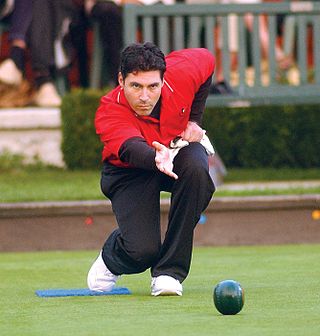
Bowls also known as lawn bowls or lawn bowling is a sport. Players try to roll their ball closest to a smaller ball. The bowls are heavier on one side so that they turn when being rolled. The game is played either in teams or one against one.

The Late Show is a popular Australian comedy sketch and satire show, which ran for two seasons on the ABC. It aired weekly on Saturday nights from 18 July 1992 to 30 October 1993.
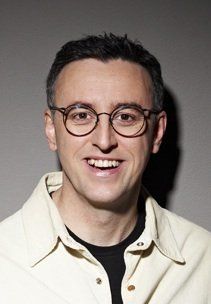
Anthony Francis Martin is a New Zealand comedian, writer and actor, who has had a successful TV, radio, stand-up and film career in Australia.
Michael Molloy is an Australian comedian, writer, producer, actor and television and radio presenter who has been active in radio, television, stand-up and film. He currently hosts The Front Bar on the Seven Network.
The D-Generation was a popular and influential Australian TV sketch comedy show, produced and broadcast by the Australian Broadcasting Corporation (ABC) for two series, between 1986 and 1987. A further four specials were broadcast on the Seven Network between 1988 and 1989. The show would also serve as a stepping stone for many early incarnations of iconic characters, including Lynne Postlethwaite, Gina Hard-Faced B***h, Eileen Maverick and Kelvin Cunnington.
Martin/Molloy was an Australian radio program starring Tony Martin and Mick Molloy, both formerly of The D-Generation and The Late Show. It was broadcast nationwide on 54 radio stations for two hours on weekday evenings between 1995 and 1998.

Mullet is an Australian film released in 2001, written and directed by David Caesar, and starring Ben Mendelsohn, Susie Porter and Andrew Gilbert.
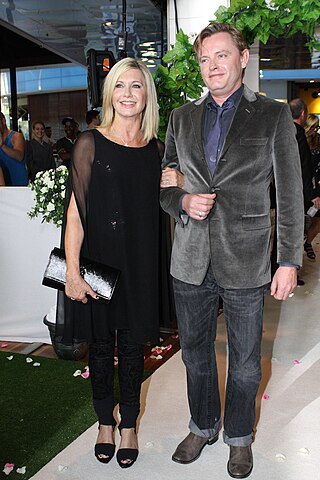
Stephan Elliott is an Australian film director and screenwriter. His best-known film internationally is The Adventures of Priscilla, Queen of the Desert (1994).
Peter Philip Smith OAM is a retired Australian radio and television voice-over artist. He is primarily known for his work with GTV-9 Melbourne as their chief staff announcer, including being the announcer on the nationally screened quiz show Sale of the Century for 21 years.

Corowa is a town in the state of New South Wales in Australia. It is on the bank of the Murray River, the border between New South Wales and Victoria, opposite the Victorian town of Wahgunyah. It is the largest town in the Federation Council and was the administrative centre of the former Corowa Shire. The name could have derived from an Aboriginal word referring to the curra pine which yielded gum used by Aboriginal people to fasten the heads of spears to the shafts. Another translation is "rocky river".
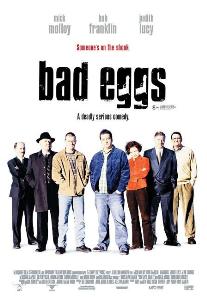
Bad Eggs is a 2003 Australian comedy movie, written and directed by Tony Martin. It stars Mick Molloy, Bob Franklin and Judith Lucy, with Alan Brough, Bill Hunter, Marshall Napier, Nicholas Bell, Steven Vidler, Shaun Micallef, Robyn Nevin, Brett Swain, Denis Moore and Pete Smith having supporting roles.
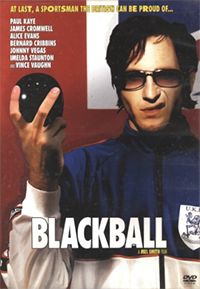
Blackball is a 2003 British sports comedy film, based on the game of lawn bowls. The screenplay was written by Tim Firth, and the film was directed by Mel Smith. The film features James Cromwell as a master bowls player, and Paul Kaye as a naturally talented player who have differing social backgrounds; who are placed together by Vince Vaughn to play for England against Australia. Its fictional plot is based on the bowls player Griff Sanders, who was also referred to as "The Bad Boy of Bowls".

Judith Mary Lucy is an Australian comedian and actress, known primarily for her stand-up comedy. Lucy joined the team of the ABC's The Weekly with Charlie Pickering in 2019.
Paul McCarthy is an Australian comedy actor. He is best known for sketch comedy television series Comedy Inc.
Brett Swain is an Australian actor and comedian.
Robert James Hornery was an Australian actor. He won both the Helpmann Awards and the Equity Awards lifetime achievement award, with a career spanning 60 years, in both Britain and Australia. He was well known for his ability to ad lib.
Stephen John Glasson OAM is an Australian bowls player. He was number one in the world in 2004 and was ranked first in Australia between 1997 and 2005. He is currently the Australian national bowls coach.

Newsfront is a 1978 Australian drama film starring Bill Hunter, Wendy Hughes, Chris Haywood and Bryan Brown, directed by Phillip Noyce. The screenplay is written by David Elfick, Bob Ellis, Philippe Mora, and Phillip Noyce. The original music score is composed by William Motzing. This film was shot on location in Sydney, New South Wales, Australia. Incorporating much actual newsreel footage, the film is shot in both black and white and colour.
Crackerjack is a 1994 direct-to-video action film directed by Michael Mazo and starring Thomas Ian Griffith, Nastassja Kinski and Christopher Plummer.

Australian comedy refers to the comedy and humour performed in or about Australia or by the people of Australia. Australian humour can be traced to various origins, and today is manifested in a diversity of cultural practices and pursuits. Writers like Henry Lawson and Banjo Paterson helped to establish a tradition of laconic, ironic and irreverent wit in Australian literature, while Australian politicians and cultural stereotypes have each proved rich sources of comedy for artists from poet C. J. Dennis to satirist Barry Humphries to iconic film maker Paul Hogan, each of whom have given wide circulation to Australian slang.











